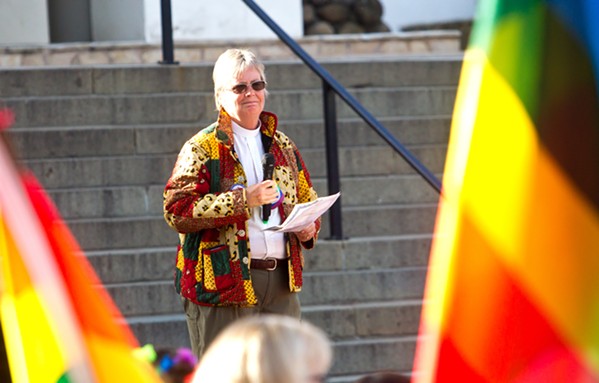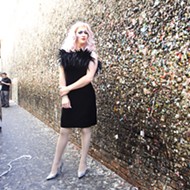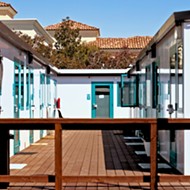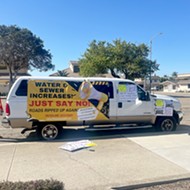[{
"name": "Newsletter Promo",
"id": "NewsletterPromo",
"class": "inlineCenter",
"insertPoint": "4",
"component": "15264767",
"requiredCountToDisplay": "0"
},{
"name": "Ad - Medium Rectangle CC01 - 300x250",
"id": "AdMediumRectangleCC01300x250",
"class": "inlineCenter",
"insertPoint": "8",
"component": "2963441",
"requiredCountToDisplay": "12"
},{
"name": "Ad - Medium Rectangle LC01 - 300x250",
"id": "AdMediumRectangleCC01300x250",
"class": "inlineCenter",
"insertPoint": "18",
"component": "2963441",
"requiredCountToDisplay": "22"
},{
"name": "Ad - Medium Rectangle LC09 - 300x250",
"id": "AdMediumRectangleLC09300x250",
"class": "inlineCenter",
"insertPoint": "28",
"component": "3252660",
"requiredCountToDisplay": "32"
}]
"They know God's justice requires that those who do these things deserve to die, yet they do them anyway. Worse yet, they encourage others to do them, too."
It was the Bible verse heard round SLO County. The passage from the book of Romans was part of a lengthy letter to the editor by former SLO High School teacher Michael Stack in response to stories about LGBTQ students in the school's student newspaper, Expressions.
"I love the staff and students at SLOHS," Stack wrote. "My students know that. But I love God more, so in obedience to Him, I am writing this letter."
The letter set off a firestorm of controversy both on social media and in the community, ending with Stack's resignation from the district and prompting a vocal, visible response from the local LGBTQ community and its allies.
The incident was a flashpoint for the issue of gay youth, and it touched on the complex and often tense relationship between LGBTQ individuals and religion. That tension isn't lost on local religious leaders like Rev. Jason Sisk-Provencio, a gay man and senior pastor
"It's troubling to see what is essentially the good news about God's inclusive love being twisted into a kind of weapon to hurt people," said Sisk-Provencio, who changed the sign outside his church to read, "We believe that God loves all students," in the days following the public furor over Stack's letter.
"The Bible is a record of God's inclusive love for humanity," he said.
The complicated relationship that many LGBTQ Americans have with religion appears to be borne out
Trying to reconcile faith with sexuality, particularly for people raised in a church that is unwelcoming to the gay community, can be an extremely difficult and painful experience. The Rev. Caroline Hall,
"It was a very difficult time for me in my teens and early adulthood as I realized that not only was I gay, but that it wasn't going away," Hall told New Times. "My attempts to pray it away and my attempts to be a good Christian, which at that point meant being heterosexual, were not working for me."
Hall said she was eventually able to come to a belief that God loved her for who she was, and that understanding only grew as she discovered an LGBTQ-friendly church where she felt welcomed and didn't have to leave her sexual orientation "at the door" in order to be a part of a Christian community. Eventually, she began the process to become ordained.
"I felt that I was celebrated with the whole of me, that there wasn't some part of me that was left outside the service," she said.
Further Pew
Hall said she understood the reluctance of some LGBTQ people to come back to Christianity, particularly in light of the anti-gay rhetoric that swirled around hot-button issues like California's Proposition 8, which some major Christian churches supported.
"Many gay people got very hurt by the church or by Christianity because they heard such negative
Daniel Pfau experienced a similar struggle when he came out as a gay teen in SLO County. Pfau, who now lives in Michigan, was placed in faith-based "restorative therapy," a program that has since been banned in California, with the hopes that he could become straight through prayer.
Pfau wrote an op-ed to New Times in the wake of the incident at SLO High School. Pfau said he struggled for a
"After going through ex-gay therapy with a Christian counselor, many situations relating to religion became difficult to endure," Pfau wrote in an email to New Times. "I have, at times, avoided religion to prevent unwanted emotions."
Hall said many individuals looking for an inclusive church can sometimes be reticent to once again engage with Christianity and participate in services.
"Some people have theological questions because they've been told for so long that you can't be gay and love God, or that you can't be gay and be a Christian," Hall said. "Other people have questions and concerns about how they are going to be accepted by the church members."
Hall said she tries to get across her belief that God's love is unconditional and that everyone, including those in the LGBTQ community,
"It's important to say, 'God created me the way I am, and that's gay,'" she said. "I guess from a spiritual perspective, God made each one of us uniquely the way we are and loves us unconditionally. So the question is: Where can we best express who we are in the service and worship of God?"
Finding the right church can be a challenge, but recently several websites and other resources have become available for LGBTQ families and individuals looking for a welcoming and friendly church. One of those sites, gaychurch.org, contains a searchable database of accepting Christian churches. A search for San Luis Obispo shows a total of 13 churches, including Hall's, within SLO County.
One of the website's founders, the Rev. Elaine Sundby said that she, also, had a challenging journey to close the gap between her sexual orientation and her perception of her faith. Ironically, Sundby said it was the same Bible passage that Stack used in his letter to Expressions that helped her reconcile her feelings and marry her wife, Pam.
"While I'm not perfect, I can easily say I am a happier, more loving person because I listened to God and followed my heart to unite my life with another wonderful woman over 31 years ago," Sundby wrote in a response to questions from New Times.
Welcoming the LGBTQ community into a church doesn't just offer spiritual fulfillment to those specific individuals, but also a chance for the churches themselves to grow, according to Hall.
"I think it really opens people's perceptions of diversity," Hall said. "If you go to a church where everyone is the same as you, you don't get challenged ... having LGBTQ people in the faith community opens up other members in the community to new possibilities." Δ
Contact Staff Writer Chris McGuinness at [email protected].
Latest in News
Comments (3)
Showing 1-3 of 3
Readers also liked…
-

Coast Unified teachers upset over new position's salary and qualifications
Oct 20, 2022 -

SLO police identify alleged driver who hit and killed couple
Dec 22, 2022 -

When the levee breaks: Oceano residents, county officials walk a tightrope of regulations to manage Arroyo Grande Creek, which some say led to the levee's failure in January
May 18, 2023









